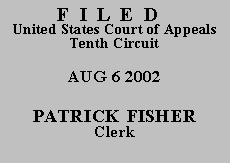 UNITED STATES COURT OF APPEALS
UNITED STATES COURT OF APPEALS
 UNITED STATES COURT OF APPEALS
UNITED STATES COURT OF APPEALS
| ROBERT ROME SCHIEBERT, | |
| Plaintiff - Appellant, | |
| v. | |
| JOHN GRUBBS, Warden of the Jackie Brannon Correctional Center; BOBBY STEVENS, Supervisor of the Oklahoma State Industries Meat Plant; and BILL EDWARDS, Assistant Supervisor of the Oklahoma State Industries Meat Plant, | |
| Defendants - Appellees. |
Before KELLY, McKAY, and
MURPHY, Circuit Judges.
This is a pro se state prisoner § 1983 civil rights appeal. Appellant sought monetary damages for Fourteenth Amendment due process and equal protection violations when he was removed from his assigned prison job as a meat cutter. Appellant was seventy-one years old at the time he was terminated. Appellant claimed that he was fired because of his age, while Defendants claimed that physically he could no longer perform the work at the meat packing plant. Appellant's administrative grievance was denied, and the denial was affirmed on administrative appeal. The district court granted Defendants' Motion for Summary Judgment. Mr. Schiebert appeals to this court.
Appellant alleges that he was fired from his prison job because of his age in violation of his equal protection rights. Since age is not a suspect class under the Equal Protection Clause and since no action was taken which injured a fundamental right, the state may discriminate on the basis of age if the age classification is rationally related to a legitimate state interest. Riddle v. Mondragon, 83 F.3d 1197, 1207 (10th Cir. 1996); see also Kimel v. Florida Board of Regents, 528 U.S. 62, 83 (2000) ("age is not a suspect classification under the Equal Protection Clause"); Williams v. Meese, 926 F.2d 994, 998 (10th Cir. 1991) (a prisoner has no right to prison employment or a particular prison job). In the instant case, we agree with Appellees that "[p]reserving [Appellant]'s health, maintaining the quality of work at the plant, and preserving security at the meat plant [are] three legitimate state interests." Aple. Br. at 8.
Appellant also argues that prison officials violated his due process rights when they terminated him. However, Appellant does not possess a constitutionally protected interest in his prison job. As stated above, state prisoners do not have a constitutionally protected liberty interest in prison employment regardless of statutes or prison regulations permitting them to work. See Penrod v. Zavaras, 94 F.3d 1399, 1407 (10th Cir. 1996); Templeman v. Gunter, 16 F.3d 367, 370 (10th Cir. 1994); Williams, 926 F.2d at 998. Thus, Appellant's procedural due process claim must fail.
After a thorough review of the briefs and the record and for substantially the same reasons set forth in the district court's well-reasoned February 27, 2002 Order, we agree that there is no genuine issue of material fact in this case.
Accordingly, we AFFIRM the district court's decision.
Entered for the Court
Monroe G. McKay
Circuit Judge
*. This order and judgment is not binding precedent, except under the doctrines of law of the case, res judicata, and collateral estoppel. The court generally disfavors the citation of orders and judgments; nevertheless, an order and judgment may be cited under the terms and conditions of 10th Cir. R. 36.3.